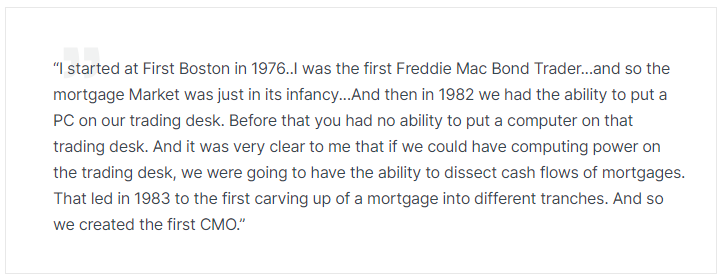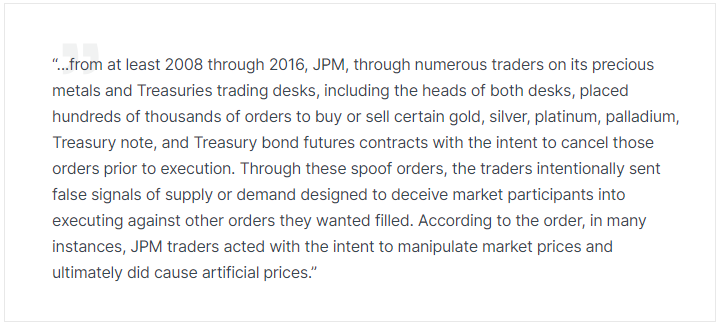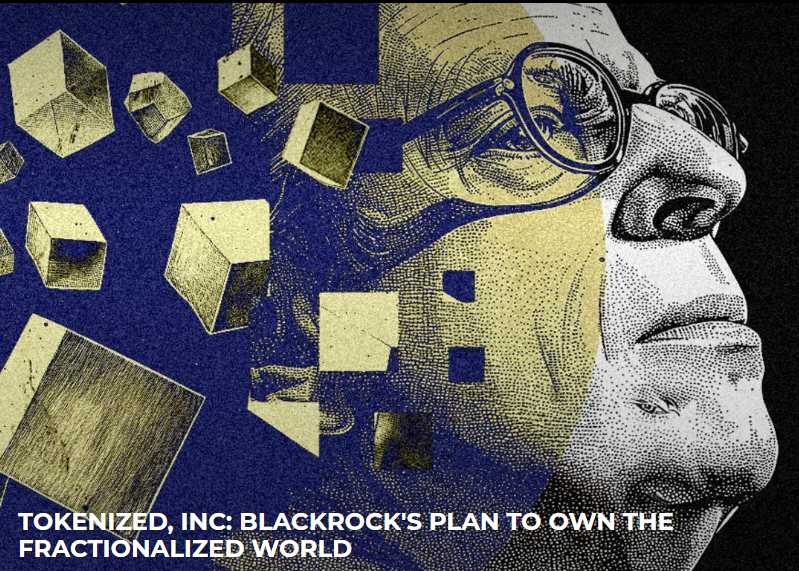Just one day after the January 11 approval of 11 Bitcoin spot ETFs – including BlackRock’s iShares Bitcoin Trust (IBIT) – by the U.S. Securities and Exchange Commission, BlackRock Chair and CEO Larry Fink sat down with Bloomberg's David Westin to discuss the implications of the world's largest asset manager entering the Bitcoin market. Not one to mince words, Fink articulated a clear framework for his company's approach to Bitcoin, and furthermore for BlackRock's intention to replicate similar ETF products for other assets. “If we can 'ETF' a Bitcoin, imagine what we can do with all financial instruments.” Fink continued, speaking about Bitcoin itself, stating “I don’t believe it’s ever going to be a currency. I believe it’s an asset class.”
Bitcoin: Commodity, Not Currency
While the BlackRock Chair was not shy about expressing other aspects of the potential build of tokenized, digital markets, these two statements in particular illuminate the coveted path forward for how the biggest institutions intend to carefully integrate Bitcoin into the legacy financial system. Fink even went so far as to turn the abbreviated noun “ETF," an exchange-traded fund, into a verb, gloating about transmuting the Bitcoin protocol into just another speculative commodity – all the efforts of miners and nodes across the world to decentralize trust in issuance and settlement reduced to a paper offering by their iShares division.
The biggest players in the United States dollar system are all but clamoring over each other to offer such products to their retail customers, understanding that this axiom neuters Bitcoin as a viable currency capable of competing with the day-to day bargaining and settlement utility of the dollar. There are many reasons to believe the US dollar system has much to gain from a dollar-denominated appreciation of bitcoin, but significantly less so if the protocol itself is capable of serving the everyday transactional needs of billions across the globe. One of the most common rebuttals to the claim that bitcoin cannot scale to become a functioning currency is the Lightning Network. While the trustless method of shared unspent transaction outputs (UTXOs) via hashed time locked contracts (HTLCs) payment channels is quite novel, the ultimate endgame for such a model servicing billions necessitates a large amount of liquidity (in bitcoin terms) locked up within the network. A centralized Lightning Network brings about many issues of privacy, transactional censorship, and even user access restrictions, not to mention the mathematical realities of demand for Bitcoin's limited blockspace when opening a billion channels.
Many FinTech companies, such as Lightning Labs and Blockstream, have spent millions in capital developing methods for utilizing Bitcoin as a way to issue tokenized assets, such as stablecoins like Tether's USDT, in order to transact dollar-denominated tokens via Lightning channels or federated sidechains. While the institutional adoption dreamed of by early Bitcoin adopters has certainly come to fruition, the actualization and methods of these institutions is clear: bitcoin must remain an asset, and all effort on scaling it as a currency should be directed towards the dollar. Fink himself in the same Bloomberg interview stated “We believe ETFs are a technology no different than Bitcoin was a technology for asset storage.” Bitcoin Spot ETF products encourage many practices far outside the norm of the typical Bitcoin user within the near decade and a half of its existence; e.g. trusting a custodian with your keys, limiting exchange to US business days and hours, and aggregating individual exposure into a collective paper claim managed and surveilled by highly-regulated brokers.
The anti-State revolution that has dominated most Bitcoin discourse since 2009 has become colored by red, white, and blue ticker tape. Furthering the idea that the US has much to gain from the adoption and co-option of Bitcoin is the tangible stash of coins distributed within its borders; MicroStrategy's 189,150 bitcoin, the 215,000 bitcoin seized by the Department of Justice, Block.one's 164,000, Grayscale's 487,000 in GBTC, and now the new US spot ETF offerings hold a combined 170,174 bitcoin as of 1/31. This is inarguably a meaningful portion of the circulating supply of bitcoin, not to mention the likely possibility of further treasuries held off the books by American investors. Bitcoin is already making US ETF inflow history, as the combined growth within the first two weeks has already outpaced the decades-long entirety of the silver spot ETF market. Any liquidity needed for an institutional Lightning Network that could compete with legacy payment providers such as Visa or MasterCard is already safely nestled within the borders of the United States, and thus well-within reach of the regulatory arms of the DoJ, SEC, Treasury, and Federal Reserve.
Within the S-1 Registration Statement filing for the iShares' Bitcoin Trust (IBIT) application is a clause that states:

While this may appear as simply due diligence for a securities offering, there is recent precedent of an iShares product being liquidated after pressure from the SEC due to geopolitical advancements, specifically the Russian invasion of Ukraine. In a press release from that same day, the iShares MSCI Russia ETF (ERUS) announced the suspension of “right of redemption of fund shares pursuant to an exemptive order issued by the [SEC]”, effective August 3, 2022, in order to “permit the fund to liquidate its portfolio.” Two weeks after the announcement, the press release stated that “BlackRock will begin liquidating ERUS by distributing its current liquid assets to shareholders,” after removing the estimated fees associated with the liquidation and transactions. Russian forces’ incursion into Ukraine triggered capital controls and sanctions from the consortium of related regulatory arms of the US government, which in turn restricted BlackRock – and all non-Russian investors – from participating in the Russian securities market. The final clause of the press release communicates that due to the unknown circumstances, “there can be no assurance that shareholders would receive any liquidating distribution relating to the Russian securities and depositary receipts after the initial distribution.”
One does not have to look too far back into recent history to see the last time the United States found itself face to face with its own geopolitical crisis during the COVID-19-induced lockdown and stimulus spearheaded by the Trump administration. BlackRock was chosen by the Federal Reserve during the third week of March 2020 to manage three debt buying programs, not to mention Canada’s central bank hiring Fink's firm to advise commercial paper purchases, nor the contract they were given by the European Union banking system to aid in sustainability. “People like Larry Fink we’re talking to, that’s BlackRock – we have the smartest people, and they all want to do it,” Trump told reporters during a White House press appearance in which he announced the largest stimulus package in the country's history – a $2 trillion bill.
Before entering the White House, Fink had helped manage Trump's finances, and after a 2017 meeting with his administration, made note of his previous relationship by stating “In every meeting we had, he talked about doing more...I didn’t think 'doing more' meant [being] the president.” It was no surprise then that just three years later, Trump would be employing Fink once again to manage the stimulus distribution programs alongside former majority BlackRock shareholder, Bank of America. “I do believe it's going to continue to bring opportunities for us,” Fink stated during a 2020 earnings call, referring to government assignments. As if predicting the coming profiteering off the unprecedented government lockdowns, in a 2011 interview with Bloomberg, Fink went so far as to say “Markets don't like uncertainty. Markets like, actually, totalitarian governments... Democracies are very messy.”
BlackRock and Fink's habit of aiding the government during moments of crisis started long before 2020, however, with the asset manager also playing a large role in the aftermath of the 2008 Great Financial Crisis. The 2008 crash significantly influenced a shift in financial markets, with investors increasingly embracing ETFs. Having held only $531 billion in 2008, according to data from Bloomberg, these funds now hold approximately $4 trillion in the US – a substantial and consequential increase.
BlackRock's ascent to prominence owes much to its strategic embrace of ETFs. Originally focused on bonds, the firm managed assets worth about $1.3 trillion at the end of 2008. BlackRock's pivotal move into ETFs came with its acquisition of Barclays Global Investors in 2009, which followed Barclays' decision to sell only after opting out of UK government bailout assistance. It was in this merger that BlackRock purchased the iShares brand from Barclays. The New York-based BlackRock paid $13.5 billion to the London-based Barclays, and by the time the deal closed at the start of December 2009, BlackRock had doubled its assets under management from $1.44 trillion to $3.29 trillion. This made BlackRock the world's biggest money manager – a crown it still wears. Presently, BlackRock also holds the distinction of being the world's largest global issuer of ETFs.
BlackRock's involvement in government advisory services solidified critical partnerships in the aftermath of the 2008 crisis. The company secured mandates to manage portfolios laden with toxic assets from entities like Bear Stearns, American International Group Inc., Freddie Mac, Morgan Stanley, and others, leveraging CEO Fink's expertise in structuring mortgage-backed securities, a field which he had helped pioneer.
As Fink stated in 2020:

Fink had started his career at a trading desk at First Boston in 1976, and was quickly made head of a division in the then-unknown mortgage-backed securities market, which is estimated to have eventually added $1 billion to the firm's books. He was also instrumental in the $4.6 billion securitization of GMAC auto loans at the start of 1986 and became the youngest member of its management committee at 31 when he was made managing director. After getting caught on the wrong end of then-Fed Chair Paul Volcker's unprecedented interest rate manipulation in the late 1980s, his desk lost $100 million in the second quarter of 1986. First Boston made it clear that when Fink finally left the firm in 1988, he had been fired.
Despite his difficult exit from First Boston, over the next two decades Fink's new firm BlackRock would become an integral figure within the public-private merger of the US dollar system. For example, in the summer of 2011, then-US Treasury secretary Tim Geithner was negotiating the raise of the debt-ceiling. After an agreement was made on the last day of July, Fink was the second number dialed from Geithner's office, only behind then-Fed Chair Ben Bernanke. The Treasury secretary also made calls that day to Lloyd Blankfein, then-CEO of Goldman Sachs, and J.P. Morgan's Jamie Dimon. According to reports, Geithner had called Fink “at least 49” times during the previous 18 months – a testament to BlackRock's political influence.
Much like it positioned itself close to regulators and governments during 2008 and 2020 to maximize profiteering within the private sector during a global economic crisis, BlackRock todayfinds itself cozied up to the public sector as the country deals with the downstream effects of the largest stimulus packages in history, and the US dollar system readies itself to embrace bitcoin in a meaningful way.
Many of the popular arguments for why bitcoin is a better store of value than gold or other precious metals are predicated on the idea that the underlying price discovery within their markets reject fractionalized gamification and tokenized re-hypothecation due to the ever-auditable nature of Bitcoin's blockchain. The practice of “papering” gold is but the antiquated mechanic of the coming tokenized world. "We have the technology to tokenize today," Fink told CNBC. "If you had a tokenized security... the moment you buy or sell an instrument, it's known it’s on a general ledger that is all created together.” Market makers such as BlackRock entering the Bitcoin space are relying on Number Go Up-induced amnesia of their lengthy forays into asset manipulation, alongside a false understanding of blockchain's technology ability to limit fraud. Fink finishes his handwaving by outright stating: “This eliminates all corruption, having a tokenized system."
Corrupting The Ledger: Market Manipulators
At the end of 2023 on December 23, just two weeks before the Bitcoin Spot ETFs were approved, BlackRock named American banking titan J.P. Morgan, alongside Jane Street Capital, as “their authorized participants” in filing with the SEC. At the time, this made BlackRock the first Bitcoin Spot ETF applicant to select who would be responsible for acquiring the necessary bitcoin, in this case on behalf of the iShares issuance. This was seen as a surprising move due to J.P. Morgan Chase CEO Jamie Dimon's recent negative comments on Bitcoin. “I’ve always been deeply opposed to crypto, bitcoin, etc.,” the Board of Directors member for the Federal Reserve Bank of New York said during a Senate Banking Committee hearing last December. “The only true use case for it is criminals, drug traffickers...money laundering, [and] tax avoidance.” He later added, “If I was the government, I’d close it down.”
Despite the public rhetoric from Dimon, J.P. Morgan debuted the Tokenized Collateral Network, or TCN, in October 2023, as the largest US bank by assets facilitated a transfer of tokenized money market funds from BlackRock to Barclays for collateral within an over-the-counter (OTC) derivatives trade. A few years prior to their ventures in blockchain settlement and Bitcoin ETF participation, J.P. Morgan won the rights to manage over a $1 trillion in assets for BlackRock, taking the business from State Street Corp in a deal struck in January 2017, firmly placing J.P. Morgan behind only BNY Mellon for total assets under custody. Later on, in 2021, BlackRock announced further diversification from custodian State Street with partnerships with BNY Mellon and Citigroup to custody assets from their iShares division. BlackRock said Citigroup will handle around “40% of the funds” while J.P. Morgan takes 30% and “BNY Mellon and State Street each take 15%.”
While Fink may believe that somehow blockchain technology will supplant corruption in financial markets, he routinely finds himself paired with the notorious criminal banking enterprise led by Dimon. After a three-week trial at the end of Summer 2022, Michael Nowak and Gregg Smith – the former head of the J.P. Morgan's precious-metals business and lead gold trader – were convicted on fraud, manipulation, and spoofing charges by a federal jury in Chicago. The US Justice Department alleged “the precious-metals business at J.P. Morgan was run as a criminal enterprise” in their biggest ever case of financial fraud. During closing arguments, head prosecutor Avi Perry stated that “they had the power to move the market, the power to manipulate the worldwide price of gold.”
In a September 2020 release from the Commodity Futures Trading Commission, the CFTC stated that:

The order also found that J.P. Morgan Securities, a “registered futures commission merchant” had “failed to identify, investigate, and stop the misconduct.” Despite “numerous red flags, including internal surveillance alerts, inquiries from CME and the CFTC,” and even with an employee alleging misconduct, JPMS “failed to provide supervision to its employees sufficient to enable JPMS to identify, adequately investigate, and put a stop to the misconduct.” The CFTC order also notes that at the start of investigation, J.P. Morgan “responded to certain information requests in a manner that resulted in the Division being misled.”
J.P Morgan was forced to pay nearly $1 billion to settle allegations of fraud within the precious metals and Treasury markets, with the final $920 million tally being by far the largest fine by a financial institution caught manipulating markets since BlackRock shareholder Bank of America's nearly $17 billion dollar fine for its role in the financial crisis of 2008. "At almost $17 billion, today's agreement with Bank of America stands as the largest the department has ever made with a single entity in American history," stated then-Associate Attorney General Tony West.
Then-Attorney General Eric Holder and West disclosed on August 21, 2014 that the Department of Justice had finalized a $16.65 billion settlement with Bank of America Corporation – the most substantial civil settlement with a single entity in American history — to address federal and state claims against BofA and its past and present subsidiaries, including Countrywide Financial Corporation and Merrill Lynch. As part of this resolution, the bank committed to a $5 billion penalty under the Financial Institutions Reform, Recovery and Enforcement Act (FIRREA) – the most significant FIRREA penalty ever – and pledged billions of dollars in relief to distressed homeowners. The Justice Department and the bank resolved several ongoing civil investigations related to the “packaging, marketing, sale, arrangement, structuring and issuance” of residential mortgage-backed securities (RMBS), collateralized debt obligations (CDOs), and the bank's practices regarding the underwriting and origination of mortgage loans. The settlement incorporated a statement of facts, in which the bank acknowledged selling billions of dollars of RMBS without disclosing key facts about the quality of the securitized loans to investors. The bank also admitted to originating risky mortgage loans and providing misleading information about the quality of those loans to Fannie Mae, Freddie Mac, and the Federal Housing Administration (FHA).
As for BlackRock itself, the SEC fined the firm $2.5 million in October 2023 for "failing to accurately describe investments,” in additional to $12.5 million in April 2015 for “failing to disclose a conflict of interest of a portfolio manager who ran another business,” as well as $340,000 “to settle charges that it improperly used separation agreements in which exiting employees were forced to waive their ability to obtain whistleblower awards.” Outside of the US, The Financial Services Authority of the UK fined BlackRock nearly £10 million in September 2012, the second-largest fine levied by the FSA – £33 million paid by J.P. Morgan for the same charge – for “failing to protect client money.”
BlackRock and its partners have been a part of some of the largest financial crimes in US history, not to mention the sudden liquidation of iShares' ERUS due to pressure from the SEC after certain geopolitical developments. Fink wants you to believe the tokenization of real world assets via the blockchain will eliminate corruption – the very corruption his company and affiliates have been demonstrating is entirely possible in supposedly highly-regulated markets for decades.
Within the announcement for J.P. Morgan's Tokenized Collateral Network, Tom McGrath, the Deputy Global Chief Operating Officer of Cash Management at BlackRock stated “Money market funds play an important role in providing liquidity to investors in times of high market volatility. The tokenization of money market fund shares as collateral in clearing and margining transactions would dramatically reduce the operational friction in meeting margin calls when segments of the market face acute margin pressures.” Fink's firm was exceptionally well-positioned to take advantage of the “high market volatility” and “acute margin pressures” of both 2008 and 2020. It appears that is no different today.
As BlackRock dramatically shifts from shying away from Bitcoin due to projected ESG-related concerns downstream of its energy usage, and pivots into a full-on embrace of blockchain as a foundation of the future financial market it intends to dominate, a walk through Fink's recent dealings in “green finance” remind us not to follow the rhetoric spewed, but rather the flow of the greenbacks themselves.












 All while Pfizer—a company with a $2.3 billion criminal fine for fraudulent marketing, bribery, and kickbacks—was given blanket immunity from liability and billions in taxpayer dollars to produce a vaccine in record time with no long-term safety data.
All while Pfizer—a company with a $2.3 billion criminal fine for fraudulent marketing, bribery, and kickbacks—was given blanket immunity from liability and billions in taxpayer dollars to produce a vaccine in record time with no long-term safety data.
























